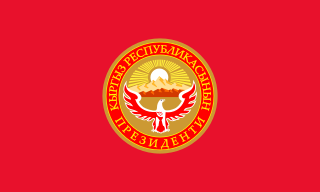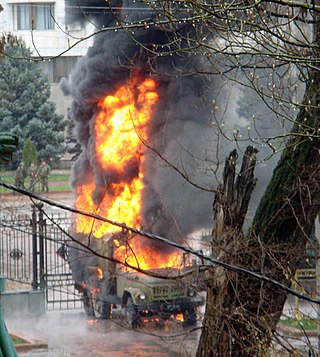
Bishkek, formerly Pishpek and Frunze, is the capital and largest city of Kyrgyzstan. Bishkek is also the administrative centre of the Chüy Region. The region surrounds the city, although the city itself is not part of the region but rather a region-level unit of Kyrgyzstan. Bishkek is situated near the border with Kazakhstan and has a population of 1,074,075, as of 2021. Bishkek is the primate city of Kyrgyzstan—it is the sole metropolis in the country, and about 17% of all inhabitants of the country live in Bishkek's metropolitan area.

The history of the Kyrgyz people and the land now called Kyrgyzstan goes back more than 3,000 years. Although geographically isolated by its mountainous location, it had an important role as part of the historical Silk Road trade route. Turkic nomads, who trace their ancestry to many Turkic states such as the First and Second Turkic Khaganates, have inhabited the country throughout its history. In the 13th century, Kyrgyzstan was conquered by the Mongols; subsequently it regained independence but was invaded by Kalmyks, Manchus, and Uzbeks. In 1876, it became part of the Russian Empire, remaining in the USSR as the Kirghiz Soviet Socialist Republic after the Russian Revolution. Following Mikhael Gorbachev's democratic reforms in the USSR, in 1990 pro-independence candidate Askar Akayev was elected president of the SSR. On 31 August 1991, Kyrgyzstan declared independence from Moscow, and a democratic government was subsequently established.

Kyrgyz is a Turkic language of the Kipchak branch spoken in Central Asia. Kyrgyz is the official language of Kyrgyzstan and a significant minority language in the Kizilsu Kyrgyz Autonomous Prefecture in Xinjiang, China and in the Gorno-Badakhshan Autonomous Region of Tajikistan. There is a very high level of mutual intelligibility between Kyrgyz, Kazakh, and Altay. A dialect of Kyrgyz known as Pamiri Kyrgyz is spoken in north-eastern Afghanistan and northern Pakistan. Kyrgyz is also spoken by many ethnic Kyrgyz through the former Soviet Union, Afghanistan, Turkey, parts of northern Pakistan, and Russia.

Kyrgyzstan, officially the Kyrgyz Republic, is a landlocked country in Central Asia, lying in the Tian Shan and Pamir mountain ranges. Bishkek is the capital and largest city of the country. Kyrgyzstan is bordered by Kazakhstan to the north, Uzbekistan to the west, Tajikistan to the south, and China to the east and southeast. Ethnic Kyrgyz make up the majority of the country's 7 million people, followed by significant minorities of Uzbeks and Russians.
The Kyrgyzstan national football team, officially recognised by FIFA and AFC as Kyrgyz Republic, represents Kyrgyzstan in international football and is controlled by the Kyrgyz Football Union, a member of the Asian Football Confederation (AFC) and Central Asian Football Association.

The president of Kyrgyzstan, officially the president of the Kyrgyz Republic, is the head of state and head of government of the Kyrgyz Republic. The president directs the executive branch of the national government, is the commander-in-chief of the Kyrgyz military and also heads the National Security Council.

The chairman of the Cabinet of Ministers of Kyrgyzstan, formerly known as the prime minister of Kyrgyzstan chairs the Cabinet of Ministers of the Kyrgyz Republic.

Manas International Airport is the main international airport in Kyrgyzstan, located 25 kilometres (16 mi) north-northwest of the capital, Bishkek.

The Supreme Council is the unicameral parliament of the Kyrgyz Republic. It was known as the Supreme Soviet of the Kirghiz Soviet Socialist Republic until 1991.

The Kyrgyz Football Union is the governing body of football in Kyrgyzstan. The organization controls the Kyrgyzstan national football team, Kyrgyzstan national futsal team and sponsors the Kyrgyz Professional Football League.

The Kirghiz Soviet Socialist Republic, also known as the Kyrgyz Soviet Socialist Republic or Kirgiz Soviet Socialist Republic, was one of the constituent republics of the Soviet Union (USSR) from 1936 to 1991. It was also known by the names Kyrgyzstan and Soviet Kyrgyzstan in the Kyrgyz language, and as Kirghizia and Soviet Kirghizia in the Russian language. Landlocked and mountainous, it bordered Tajikistan and China to the south, Uzbekistan to the west and Kazakhstan to the north. The Kirghiz branch of the Communist Party of the Soviet Union governed the republic from 1936 until 1990.

Kyrgyzstan – United States relations are bilateral relations between Kyrgyzstan and the United States.

China–Kyrgyzstan relations are the bilateral relationship between China and Kyrgyzstan.
This page shows the Kyrgyzstan national football team's results in International Matches, as recognized by FIFA:

The 2010 Kyrgyz Revolution, also known as the Second Kyrgyz Revolution, the Melon Revolution, the April Events or officially as the People's April Revolution, began in April 2010 with the ousting of Kyrgyz president Kurmanbek Bakiyev in the capital Bishkek. It was followed by increased ethnic tension involving Kyrgyz people and Uzbeks in the south of the country, which escalated in June 2010. The violence ultimately led to the consolidation of a new parliamentary system in Kyrgyzstan.
Miss Kyrgyzstan is a national beauty pageant in Kyrgyzstan. The pageant was founded in 2009, where the winners were sent to Miss Universe.
The Military ranks of Kyrgyzstan are the military insignia used by the Armed Forces of the Republic of Kyrgyzstan. Kyrgyzstan is a landlocked country, and does therefore not possess a navy. Being a former Soviet state, Kyrgyzstan shares a rank structure similar to that of Russia.
The COVID-19 pandemic in Kyrgyzstan was a part of the worldwide pandemic of coronavirus disease 2019 caused by severe acute respiratory syndrome coronavirus 2. The virus was confirmed to have reached Kyrgyzstan in March 2020.
This article provides details of international football games played by the Kyrgyzstan national football team from 2020 to present.

A series of sporadic border clashes resumed between Kyrgyzstan and Tajikistan on 27 January 2022, following a series of clashes in 2021 between the two countries. These events took place before and during Russia's invasion of Ukraine that began a month before the second clashes.














